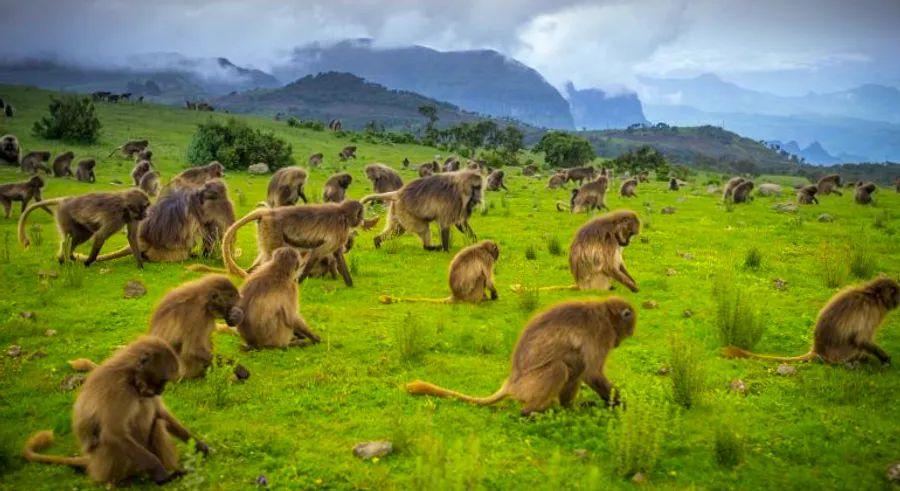Ethiopia is quickly becoming Africa's next big hotspot – here's why

Back in the late 1950s, Ethiopian Airlines launched a bold ad campaign in Western media, promoting the ancient kingdom as Africa’s 'newest travel adventure.'
More than 50 years later, this vast East African country has yet to fully embrace that reputation. However, it may not be long before it does.
The landscapes, the culture, and the heritage are already in place. Ethiopia’s ancient Orthodox Christianity has given rise to thousands of churches and monasteries, many of which are now recognized as UNESCO World Heritage Sites.
Generations of empires and kingdoms left behind medieval fortresses, palaces, and tombs, such as the Gondar Citadel and the towering stone obelisks of Axum.
From the serene Lake Tana and the majestic Blue Nile to the striking red-rock formations of the Gheralta Mountains, the scorching Danakil Desert, and the verdant Omo Valley, Ethiopia offers an astonishing range of landscapes. Its wildlife is equally diverse, from classic African savannah species in the south to rare native animals like the gelada baboon and the Ethiopian wolf.
The one missing element has always been the necessary infrastructure – the kind of hotels, dining options, and services that countries like Kenya and South Africa have perfected over the years.
Bonga: Ethiopia’s heart of Arabica coffee – and so much more
A pivotal moment
“Tourism took a back seat for a long time,” explains Solomon Tadesse, CEO of the Ethiopian Tourism Organization (ETO). “The country was undergoing significant transformations, and the government focused on priorities like health, education, and communication.”
Not to mention the ongoing challenges of drought, famine, and revolution.
“There were deep-rooted reasons why tourism infrastructure was lacking,” says Tadesse.
Tadesse explains that in 2013, the government recognized that tourism could be a powerful source of jobs, income, and wealth, just like any other vital economic sector.
A Tourism Transformation Council was formed to guide the industry, while the Ethiopian Tourism Organization (ETO) was established to oversee marketing, promotion, and product development.
This tourism push came at a time of significant foreign investment from countries like China, India, and Turkey, which helped drive Ethiopia’s GDP growth to annual rates around 10%.
With Ethiopia's economy booming, the tourism sector is gradually, yet steadily, moving toward fulfilling the high expectations set more than fifty years ago.
Photos: Africa’s breathtaking architectural marvels
Emerging infrastructure, expanding industries

Addis Ababa is experiencing a construction boom, with major projects including a vast expansion of Bole International Airport and several new hotels, such as high-rise developments from Marriott and InterContinental that are currently under construction.
A brand new superhighway now speeds traffic through the Great Rift Valley south of the capital, while a nationwide road upgrade initiative is significantly improving land connectivity between major cities.
Regional capitals are getting modern airport terminals, and in some cases, like in Jinka, new airports are being built where none existed before.
Ethiopian Airlines is also growing rapidly.
Marking its 70th anniversary this year, the national airline is undergoing a massive expansion, adding the latest Boeing and Airbus models to its fleet.
The airline’s network has expanded, with new routes to destinations such as New York, Los Angeles, Tokyo, Dublin, Cape Town, and Manila since early 2015.
Tadesse predicts that tourism arrivals will hit one million for the first time this year, doubling the number of visitors from just three years ago.
With the influx of new hotels and ongoing infrastructure upgrades, Addis Ababa is poised for a tourism boom. However, questions remain about whether the rest of the country is fully prepared to become Africa’s next major travel hotspot.
Beyond safaris: 8 unique experiences to enjoy in Kenya
New, attractive accommodations are emerging across the country.

The biggest challenge outside the capital is subpar accommodation. Even the best hotels in renowned spots like Gondar, Lalibela, and Bahir Dar are barely above backpacker standards.
The situation is even worse in the south, where only a few hotels exceed a one-star rating.
Problems include lack of air conditioning, insufficient mosquito netting, missing basic bathroom amenities, poor service, subpar restaurant offerings, and poorly maintained hotel grounds littered with trash.
But occasionally, you come across a hidden gem.
Take Gheralta Lodge, nestled in the mountains of the same name between Axum and Mek’ele in northern Ethiopia. Situated on a high ridge, the stone cottages offer sweeping views of a breathtaking red-rock landscape reminiscent of the American Southwest.
“My wife and I spent six months traveling around Ethiopia, compiling a list of 13 ideal locations for a hotel,” recalls Silvio Rizzotti, the lodge’s founder and owner. Born in Ethiopia to Italian parents, Rizzotti had a clear vision for the country’s hospitality future.
“We whittled it down to three locations, but ultimately chose Gheralta as the perfect spot to build a modern eco-lodge.”
Other new hotels are also underway in various locations. Addis Ababa-based Jacaranda is working on luxury resorts along the shores of Lake Tana near Bahir Dar, atop a hill overlooking the ancient stele of Axum, in the Simien Mountains National Park, and with views over the historic city of Gondar.
The properties will be operated by South Africa’s AHA hotel group, one of the most seasoned operators of lodges, camps, and hotels at the southern tip of the continent.
“Tourism is a relatively new industry in Ethiopia,” says Jacaranda manager Andinet Feleke. “You can’t really compare it to Kenya or Tanzania. It wasn’t a government priority until recently.”
“But in the last three or four years, things have improved significantly. There’s now a greater recognition of tourism’s importance to Ethiopia, and we are now positioned to compete with Africa’s top travel destinations.”

1

2

3

4

5
Evaluation :
5/5